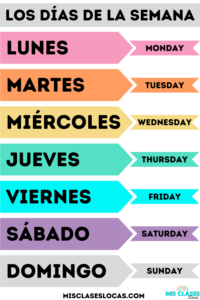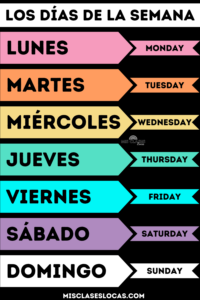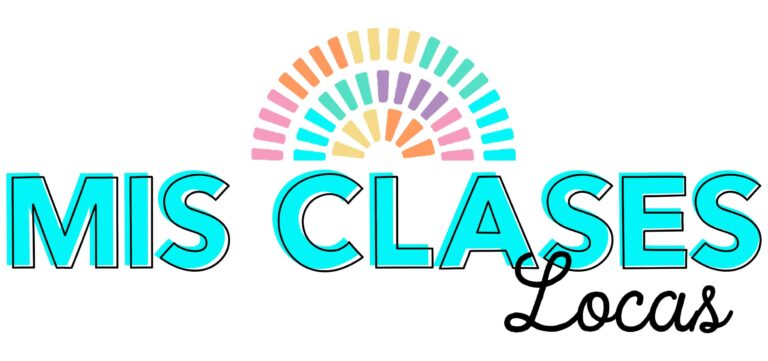Inside: Names of the week in Spanish class. Learning the names of the days of the week in Spanish. The days of the week in Spanish song. Learn the Spanish words for days of the week. Spanish days of the week.
Author: Allison Wienhold
Published: April 8, 2024 & most recently updated on April 9, 2025.

What are the Days of the Week in Spanish?
Names of the days of the week in Spanish and English. Learn the Spanish words for days of the week. Los días de la semana.

Names of the week in Spanish
- lunes – Monday
- martes – Tuesday
- miércoles – Wednesday
- jueves – Thursday
- viernes – Friday
- sábado – Saturday
- domingo – Sunday
Notice days of the week are not capitalized in Spanish. You do not start days or months of the year with capital letters in the Spanish language. Typically, the first day of the week in Latin America is Monday. This is different from most calendars in the USA that start with Sunday. It’s important to look at common phrases from native speakers in your Spanish learning journey or with any foreign language.
For Spanish speakers the pronoun in front of the specific day is important. For example, changing el lunes to los lunes changes the meaning of a sentence from talking about one particular Monday to talking about all Mondays.
Spanish Class Routines for Each Day of the Week
For many years I have used themed class starters or bell ringers in my Spanish classes. These can be used right away to start a class or as a brain break mid-class. Click each activity to learn more.
- lunes >> Weekend Chat
- martes >> martes del mapa
- miércoles >> Música miércoles
- jueves >> jaja jueves
- viernes >> baile viernes
Read more > Bell Ringers for Spanish Class & Spanish Class Routines
Get bell ringers for every single day of Spanish class >> NEW Spanish Bell Ringers Para Empezar 2025
Learn the names of the week in Spanish Class
I like to use a song to practice the Spanish words for days of the week. The best Days of the Week Songs in Spanish. The days of the week in Spanish song.

Spanish Words for Days of the Week Song in Spanish 1 – Sing the tune of the Flintstones
I can’t find a video or recorded version of my favorite way to learn the days of the week in Spanish. Just sing the days of the week in Spanish song with each line to the tune of the theme song from The Flintstones.
- lu-nes, martes, miércoles, jueves, viernes, sábado, domingo
- lu-nes, martes, miércoles, jueves, viernes, sábado, domingo
Names of the week in Spanish Song 2 – Sing the tune of The Adams Family
The days of the week in Spanish song to the tune of the Adams family. Spanish words for days of the week to the tune of the Adams family.
- días de la semana (snap snap), días de la semana (snap snap), de la semana , de la semana , de la semana (snap snap)
- lunes y martes, miércoles y jueves, viernes, sábado, yy do-min-go
- días de la semana (snap snap), días de la semana (snap snap), de la semana , de la semana , de la semana (snap snap)
I could not find a video of exactly the version I learned in school. This Youtube video shows the tune, but starts with domingo instead.
Days of the Week in Spanish song 3 – Siempre Spanish
- lunes, martes, lunes, martes, miércoles, miércoles
- jueves y viernes, jueves y viernes, sábado, domingo
- Repeat as many times as you would like
Names of the Week in Spanish – learn more
Spanish words for days of the week in depth. Origin of the days of the week.

lunes (Monday)
First, the Spanish word for Monday, lunes, comes from the Latin term “dies Lunae.” This means “day of the moon.” In many cultures, Monday is associated with the moon. As the first day of the traditional workweek, “lunes” sets the tone for the week. Just like the moon guides the night.
martes (Tuesday)
Next, Tuesday in Spanish is “martes,” derived from the Latin “dies Martis.” This day is from the Roman god of war, Mars. Day of mars. It’s a day to tackle challenges head-on and pursue one’s goals. But also, martes 13 is the day of bad luck. This is similar to Friday the 13th in the USA.
miércoles (Wednesday)
Miércoles or Wednesday, comes from Latin terms “dies Mercurii.” This is named after the Roman god Mercury, messenger of the gods. Day of mercury. In Spanish, Wednesday embodies communication, exchange, and versatility. It marks the middle of the week, signaling a time for reflection and adaptation. This is similar to Mercury’s ability to traverse different realms.
jueves (Thursday)
Then, Thursday is jueves in Spanish. It originates from the Latin “dies Iovis.” Jueves is dedicated to Jupiter, the king of the gods in Roman mythology. In Spanish-speaking cultures, Thursday is associated with expansion, growth, and abundance. It’s a day to embrace opportunities and cultivate prosperity.
viernes (Friday)
Viernes, the Spanish name for Friday, is from the Latin “dies Veneris.” Day of venus. Viernes honors Venus, the goddess of love and beauty. Viernes santo is also knows as Good Friday.
In Spanish-speaking countries, Friday embodies celebration, romance, and indulgence. It marks the end of the week and the beginning of leisure time, inviting people to unwind and enjoy life’s pleasures. A perfect time for Baile viernes!
sábado (Saturday)
Also, Saturday in Spanish, comes from the Hebrew word “shabbat,” meaning Sabbath or day of rest. In many Spanish-speaking cultures, Saturday is a time for relaxation. It’s a day to spend with loved ones and engage in activities you enjoy.
domingo (Sunday)
Lastly, Sunday is known as el domingo in Spanish, originating from the Latin “dies Dominicus.” This means “Lord’s day” or day of the lord. Sunday holds significance in many cultures including Spanish culture, as a day of rest, reflection, and religious observance for Christian tradition. It’s a time to recharge and prepare for the week ahead.

How to teach the names of the week in Spanish class
If you teach younger students or an Exploratory Spanish class, you could dedicate one class period to learning the days of the week Spanish vocabulary.
When my high school students taught Elementary Spanish Lessons across the street they often did days of week in Spanish mini-lessons. The main content was learning a day-of-the-week song.
Also, for older students having the daily calendar in the front of the room is a great visual. For novice Spanish courses, the best way is to start each class at the beginning of the year with a quick calendar talk. The daily repetition of today is… and the days of the week in Spanish spiral review all year. This informal setting naturally teaches Spanish weekdays.
For example you can see in the picture my calendar words including the following examples:
- hoy es lunes
- ayer fue domingo
- mañana es (será)
More Spanish Class Basics
- Alphabet Songs in Spanish Class
- Happy Birthday Songs Spanish Class
- Greetings Song in Spanish
- Teaching Spanish Numbers 11-20
- High-Frequency Verb Unit to Start Spanish 1
Want more Novice Spanish Resources?
Enter your email below for my #1 activity for any new group of Spanish students, name game speedball.





